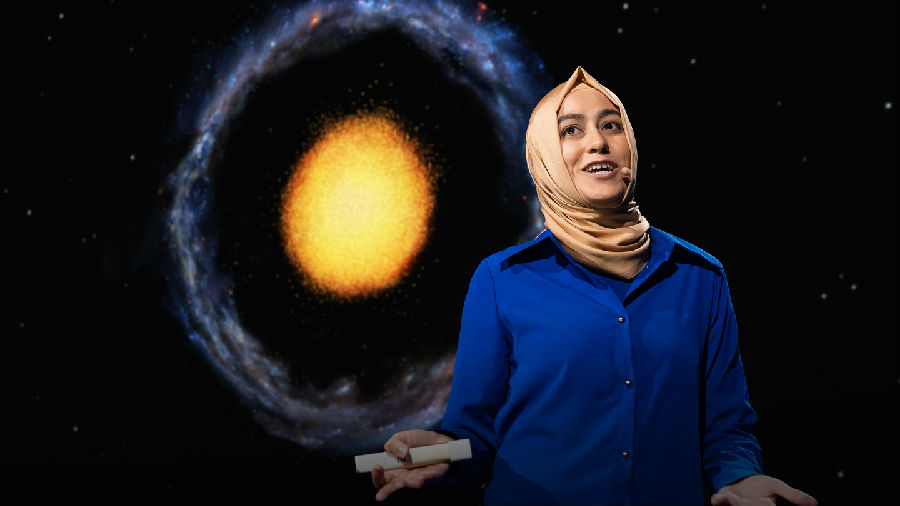(单词翻译:单击)
There are more than a trillion galaxies in the universe.
宇宙中有超过一万亿个星系。
And my team discovered an extremely rare one, a galaxy that doesn't look quite like anything observed before.
而我的团队发现了极其罕见的一个,这个星系与我们见过的其他星系都不同。
This galaxy is so peculiar, that it challenges our theories and our assumptions about how the universe works.
这个星系是如此的特别,以至于动摇了我们对于宇宙运行规律的理论和设想。
The majority of the galaxies are spiral, similar to our own Milky Way.
大多数星系都是螺旋状的,就像我们的银河系一样。
We have strong theories about how these common galaxies form and evolve.
我们可以很好地解释这些常见星系的起源和演化过程。
But we don't understand how rare galaxies form and evolve.
但是我们并不理解其他罕见星系的形成和演变过程。
An especially puzzling rare case is Hoag's Object.
霍格星系就是这样的一个令人费解而罕见的例子。
It has a very symmetric central body surrounded by a circular outer ring, with nothing visible connecting them.
它由一个非常对称的中心天体和环绕它的圆形外环组成,而这两部分之间并没有可见的物质连接它们。
Hoag-type galaxies are among the rarest types of galaxies currently known.
霍格星系属于最罕见的星系类型之一。
There are fewer than one in 1,000 galaxies.
他们只占星系总数的不到千分之一。
It's a mystery how the stars in the outer ring are just floating there in such an orderly manner.
外环中的恒星如此整齐的漂浮在那里的原因依旧是一个谜。
That's interesting, right? Hold on. Things are about to get more mysterious.
非常有意思,对吧?别急。还有更加神秘的事情。
The galaxy that my team discovered is even rarer and much more complex than that.
我们团队所发现的星系比霍格星系更加罕见,也更复杂。
You know, sometimes, you search and search for these objects, and you find nothing.
有时,我们不停地寻找一些天体,却什么也找不到。
But sometimes, it just appears in the background, when you are not even looking for it.
但也有时候,它就会在你甚至没有刻意找它的时候,出现在背景里。
This system looks very similar to Hoag's Object, with its central body and circular outer ring.
这个星系与霍格星系非常相似,也有中心天体和圆形的外环。
We got very excited and thought we discovered another Hoag's Object.
我们当时非常激动,以为又发现了一个霍格星系。
But my research showed this is an entirely new galaxy type, now commonly referred to as "Burcin's Galaxy."
但是我的研究表明,这其实是一种全新的星系,大家现在叫它“布奇星系”。

We will not be visiting this galaxy anytime soon.
我们要过很久才能探访这个星系。
It is approximately 359 million light years away from Earth.
它与地球的距离大概有三亿五千九百万光年。
You may think this is far. Well, actually, this is one of the nearby galaxies.
你可能觉得这很远。其实这个星系已经离我们相对很近了。
I study this object in different light -- in ultraviolet, optical and near-infrared.
我对这个星系在不同的电磁波长下的样子进行了研究--包括了紫外线,可见光和近红外线。
Small details on our body, like a scar or wrinkles, tell the story of our lives.
我们身体上的细微痕迹,比如一个伤痕或者皱纹,可以透露我们的生活经历。
Similarly, a galaxy's structure in different light can help us trace back their origin and evolution.
同样的,星系结构在不同电磁波长下的样子,也可以帮助我们回溯它的起源和演变过程。
How do I look for these details?
怎么寻找这些痕迹呢?
I model the bright central body and remove my model from the image to check for any hidden features,
我建立了那个明亮的中心天体的模型,并把这个模型从星系图像中移除,然后就可以寻找星系的不明显的特征,
because a bright structure in a galaxy may blind our views of faint features,
因为星系中明亮的部分可能会遮盖一些暗淡的细节,
just like using sunglasses when you are blinded by the intense light.
这就像我们在强光刺眼时会戴墨镜一样。
The result was a big surprise. This galaxy doesn't just have an outer ring, it has an additional, diffused inner ring.
研究的结果令我们非常惊喜。这个星系不仅有一个外环,还有一个稀薄的内环。
We were having a hard time explaining the origin of the outer ring in Hoag-type galaxies.
我们要解释霍格星系外环的形成过程已经很困难了。
Now we also need to explain this mysterious second ring.
现在我们还要解释这个神秘的内环。
There is currently no known mechanism that can explain the existence of an inner ring in such a peculiar galaxy.
目前没有任何理论可以解释这个如此特别的星系中内环的存在。
So the discovery of Burcin's Galaxy clearly highlights the gap in our knowledge of galaxy evolution.
所以,布奇星系的发现凸显了我们的星系演化理论的不足。
Further research into how this extremely rare galaxy was formed can provide us with new clues on how the universe works.
对这个及其罕见星系形成过程的后续研究,可以为我们理解宇宙的运行机制提供新的线索。
This discovery tells us that we still have a lot to learn,
这个发现表明我们还有很长的路要走,
and we should keep looking deeper and deeper in space and keep searching for the unknown. Thank you.
我们应该继续对太空进行更深入的研究,并继续探索未知的现象。谢谢。


